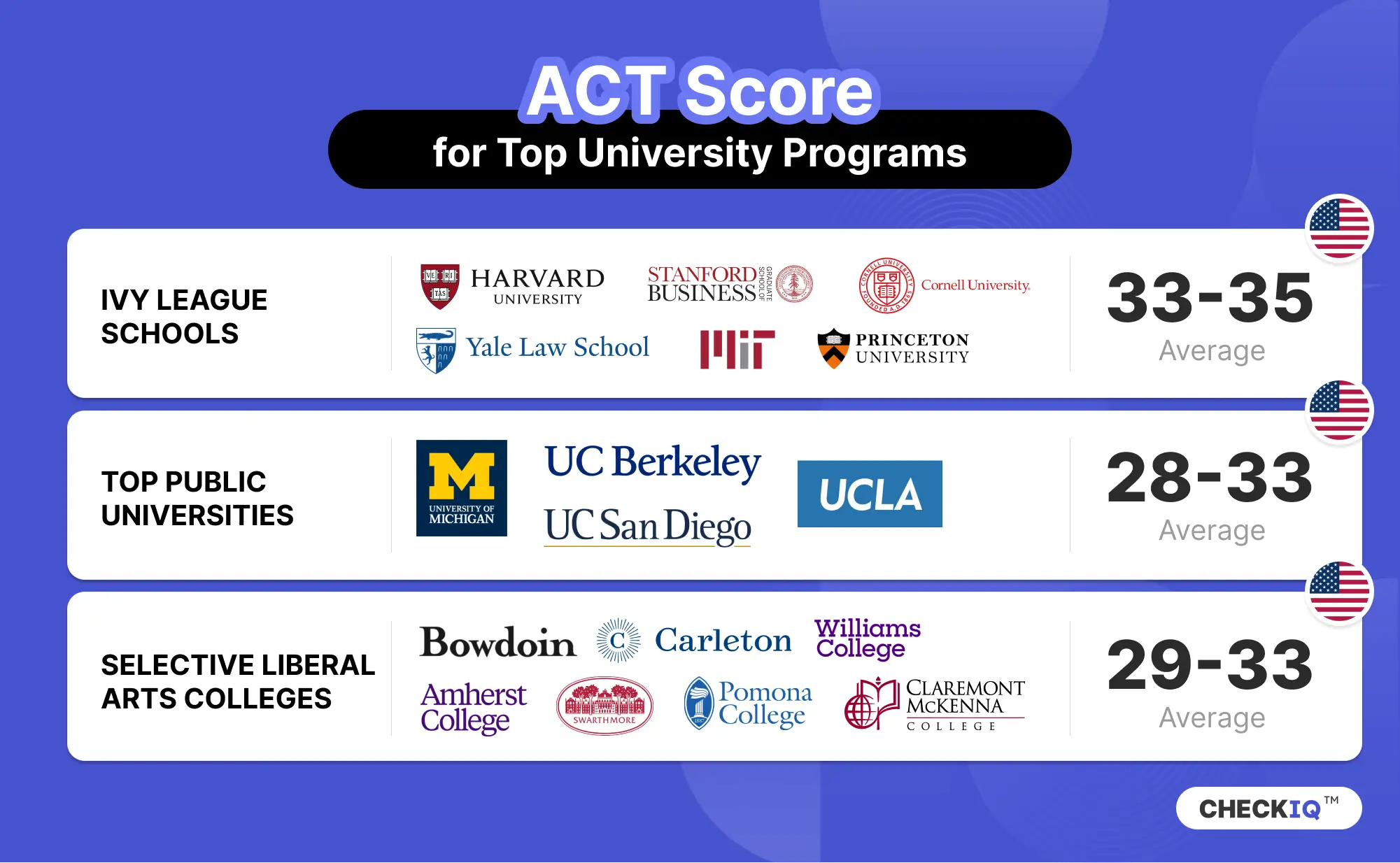
ACT to IQ Calculator
If you're a college student curious about how your ACT score relates to IQ, you're not alone. In fact, many students wonder whether standardized test performance reflects intelligence and if there's a way to convert between the two. In this article, we'll dive into these questions and provide clear answers.
What Is the ACT?
The ACT, or American College Testing exam, is a standardized test widely used for college admissions in the United States.
It measures students' academic readiness for college by evaluating four main areas:
- English: Tests grammar, punctuation, sentence structure, and rhetorical skills.
- Math: Covers algebra, geometry, trigonometry, and problem-solving.
- Reading: Assesses reading comprehension and critical thinking skills.
- Science: Focuses on interpretation, analysis, evaluation, reasoning, and problem-solving in scientific contexts.
- Optional writing section: Evaluates essay-writing skills by analyzing and developing arguments on a given topic.
The ACT is scored on a scale of 1 to 36, with the composite score being the average of the four sections. A higher score typically indicates better academic preparation and reasoning skills.
What’s the Difference Between the ACT and SAT?
The ACT and SAT are both standardized tests used for college admissions, but they have some key differences.
The ACT includes sections on English, math, reading, and science, with an optional essay. It’s known for its fast pace and a dedicated science section that focuses on interpreting data and scientific reasoning.
The SAT, on the other hand, emphasizes evidence-based reading and writing and math, with no standalone science section, though it integrates data analysis into questions. The SAT also allows more time per question and includes more complex reading passages.
In terms of scoring, the ACT uses a scale of 1-36, while the SAT scores range from 400-1600. Both tests are accepted equally by colleges, and therefore, no preference is given to one over the other. Generally, admissions officers focus more on how well you score relative to other applicants and how your results align with the school’s expectations.
Students often choose the test that best matches their strengths. Here’s what you need to take in mind:
- If you’re quick with time management and strong in science reasoning, choose the ACT.
- If you’re more comfortable with deep reading and problem-solving, choose the SAT.
- If you prefer direct questions and a fast-paced test format, the ACT might be a better fit.
- If you excel at interpreting charts, graphs, and scientific data, the ACT’s Science section may align with your skills.
- If you enjoy tackling more complex reading passages and analyzing detailed information, the SAT’s Evidence-Based Reading and Writing section could play to your strengths.
- If you’re strong in mental math or enjoy solving problems without a calculator, the SAT’s no-calculator math section may appeal to you.
- If you perform well under strict time constraints, the ACT’s quicker pace could match your test-taking style.
- If you benefit from having more time per question to carefully consider your answers, the SAT may feel less rushed.
A reliable 100% adaptive online IQ Test. Get your IQ score immediately.
Start My IQ Test
Does IQ Correlate with ACT?
Research shows a strong correlation between ACT scores and IQ, as both tests measure cognitive abilities such as analytical reasoning, problem-solving, and critical thinking.
A study by Koenig, Frey, and Detterman (2007) found that ACT scores have a substantial correlation of 0.77 with IQ measures derived from the Armed Services Vocational Aptitude Battery (ASVAB), a recognized test of general intelligence. Additionally, ACT scores demonstrated a significant correlation of 0.61 with Raven’s Advanced Progressive Matrices, a test widely regarded as a measure of fluid intelligence. This is not as high as the correlation between IQ and SAT but it’s still significant!
The correlation between IQ and ACT exists because both the ACT and IQ tests assess a common factor known as "g," or general intelligence. For instance, while IQ tests are explicitly designed to measure innate cognitive abilities, the ACT evaluates academic readiness, which also depends on specific cognitive strengths. Studies show that the ACT is comparable to traditional IQ tests in its ability to predict intellectual capacity.
Despite this relationship, it’s important to note that the ACT is not marketed as an IQ test. According to ACT, Inc., the test is designed to measure academic preparedness rather than raw intelligence. However, the strong correlation suggests that ACT scores can be used as a rough estimate of IQ, especially when other IQ measures are unavailable. Researchers and clinicians sometimes use ACT scores as a proxy for cognitive ability in large studies, particularly when direct IQ testing is impractical and ACT scores are already available, but this approach has limitations and should be interpreted with caution.
How Do You Estimate IQ Based on ACT Score?
Estimating IQ from an ACT score is about comparing percentiles. Both IQ and IQ tests follow a bell-curve distribution, so their percentiles can be aligned to provide a rough estimate.
Let’s see an example: An ACT score of 34-36 falls in the 99th percentile, corresponding to an estimated IQ of 135-145, while a national average ACT score of 21 aligns with an IQ of approximately 100. However, this method is an approximation and has several limitations as we’ll cover below.
IQ to ACT Conversion Table
Below is a simplified table aligning ACT scores with approximate IQ levels based on percentile matching:
|
ACT Score |
Percentile |
Estimated IQ |
|
36 |
99.9 |
145+ |
|
34-35 |
99 |
135-145 |
|
31-33 |
97-98 |
125-134 |
|
28-30 |
90-96 |
115-124 |
|
25-27 |
75-89 |
105-114 |
|
21-24 |
50-74 |
90-104 |
|
18-20 |
25-49 |
80-89 |
|
Below 18 |
Below 25 |
Below 80 |
This table provides rough estimates and should be taken with caution, as test preparation, educational background, and test anxiety can influence ACT performance.
Limitations of the Percentile Matching method
While percentile matching provides a general idea, it’s important to keep in mind that it’s not super precise due to key differences between the ACT and IQ tests:
- Scope of measurement: IQ tests assess various cognitive domains, such as spatial reasoning and memory, while the ACT focuses on academic skills in English, math, reading, and science.
- Population differences: ACT test-takers are often students aiming for college and may be more academically prepared than the general population assessed by IQ tests. This difference in test-taker populations can skew percentile comparisons. One way to adjust for this is by examining ACT score requirements for high-IQ societies (cf FAQ section) and normalizing ACT percentiles to match IQ thresholds accordingly.
- Influence of preparation: ACT scores can often be improved through targeted study and practice, as the test assesses academic skills and content knowledge that can be learned or refined. In contrast, IQ scores, which aim to measure cognitive abilities such as reasoning and problem-solving, tend to be less influenced by preparation or practice.
- Regression to the mean: High scores on either test may not always predict equally high results on the other, as they measure slightly different constructs of intelligence.
- Variability in tests: Over time, changes in test design and content, such as those to the SAT or ACT, can change the reliability of the correlation.
- Context of administration: IQ tests are typically administered in controlled environments by trained professionals, whereas the ACT is a standardized group test often influenced by test-day factors like stress, time management, and environmental distractions.
What ACT Level Do You Need to Get Into Top Colleges?
Top colleges like Harvard, Stanford, and MIT typically admit students with ACT scores in the 33-36 range. Here's a breakdown:
- Ivy League Schools (Harvard, Cornell, Stanford, MIT, Princeton, Yale): Average ACT scores range from 33-35.
- Top Public Universities (e.g., UC Berkeley, Michigan): Average ACT scores tend to fall between 28-33, though this can vary by program and applicant pool.
- Selective Liberal Arts Colleges: ACT scores of 29-33 are commonly reported for competitive applicants.

While a high ACT score can enhance your application, admissions decisions at top colleges are holistic. Factors such as extracurricular activities, essays, letters of recommendation, and GPA are equally important in determining acceptance.
Frequently-Asked Questions
What’s the average ACT score?
According to the official ACT statistics, the average composite ACT score for test-takers in the 2024-2025 reporting year is 19.6.
This score is calculated as the mean of all test-takers' results across the four sections: English, Math, Reading, and Science.
Individual section averages vary slightly, with English at 18.7, Math at 19.1, Reading at 20.2, Science, 19.7, Composite 19.6, and STEM at 19.7.
What’s a Good ACT Score?
A "good" ACT score depends on your goals and the colleges you're applying to. The average ACT score is 19.6, so anything higher means you’re scoring above most test-takers.
Scores between 23 and 28 put you in the top 25% to 10% (75th to 90th percentiles) of students nationwide. For instance, a score of 27 ranks in approximately the top 12%, while a score of 30 places you in the top 6% (94th percentile).
These scores show strong academic skills and can make you competitive for many colleges, especially if you also have a good GPA and strong extracurricular activities. Always check the score ranges for your target schools to set specific goals.
What’s a Genius ACT Score?
A perfect ACT score of 36 is considered a "genius" score and puts you in the top 1% of test-takers nationwide.
Scores of 34 or 35 also show near-perfect performance and place you in the top 1% as well. These scores can give you a big advantage when applying to highly prestigious schools like Harvard, Stanford, or MIT.
However, even with a very high ACT score, colleges also look at other things like your GPA, essays, and activities outside of school. Having a well-rounded application is just as important as a high test score.
What’s a good IQ score?
A "good" IQ score generally falls between 110 and 120, which is above average. The average IQ is set at 100, with most people scoring between 85 and 115. If you're in the 120-130 range, you're considered to have a superior IQ. IQ Scores above 130 are typically classified as "gifted" or "extremely intelligent."
Which high-IQ societies accept the ACT?
Some high-IQ societies accept the ACT as part of their eligibility criteria, but usually only scores from tests taken prior to specific years are considered valid.
Here's how the ACT score requirements vary across different types of institutions:
- Mensa: Requires a minimum ACT score of 29, valid only for tests taken before 1989, aligning with the top 2% of test-takers. Scores from tests taken after 1989 are not accepted.
- International High IQ Society (IHIQS): A score in the 95th percentile, approximately 29 or higher, is needed for eligibility.
- Intertel Society: Accepts scores from tests taken prior to 1989, with a minimum score in the 99th percentile, roughly 32 or higher.
- Triple Nine Society (TNS): Eligibility requires a score of 32 or higher for tests taken before 1989, representing the top 0.1% of test-takers.
- International Society for Philosophical Enquiry (ISPE): Requires a minimum score of 32 for tests taken before 1989 and 34 for those taken after 1989, reflecting the top 0.1%.
- Epimetheus Society: Requires a score of 35 or higher, representing individuals in the top 0.003% of test-takers.







